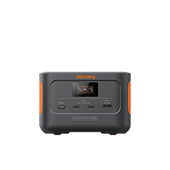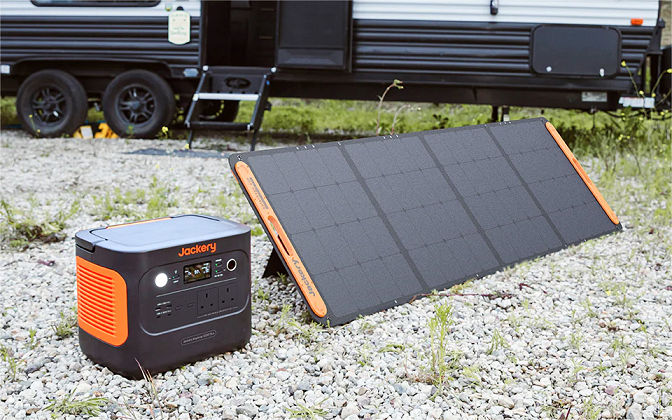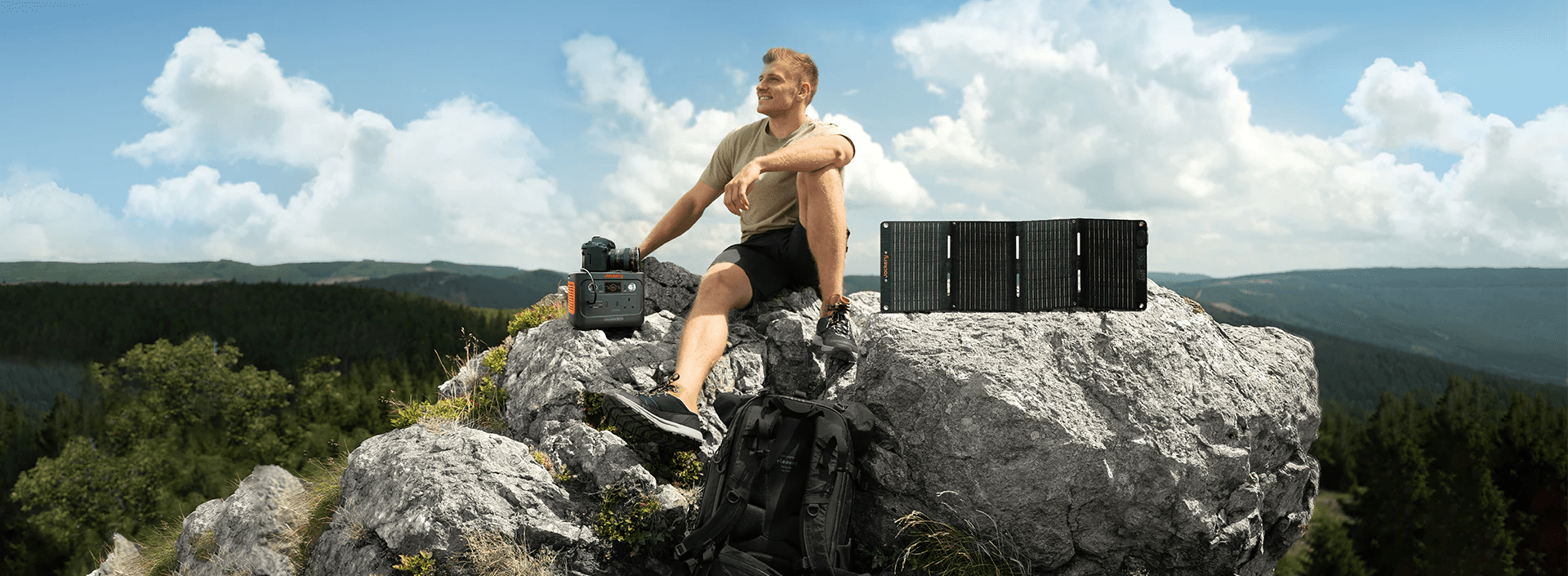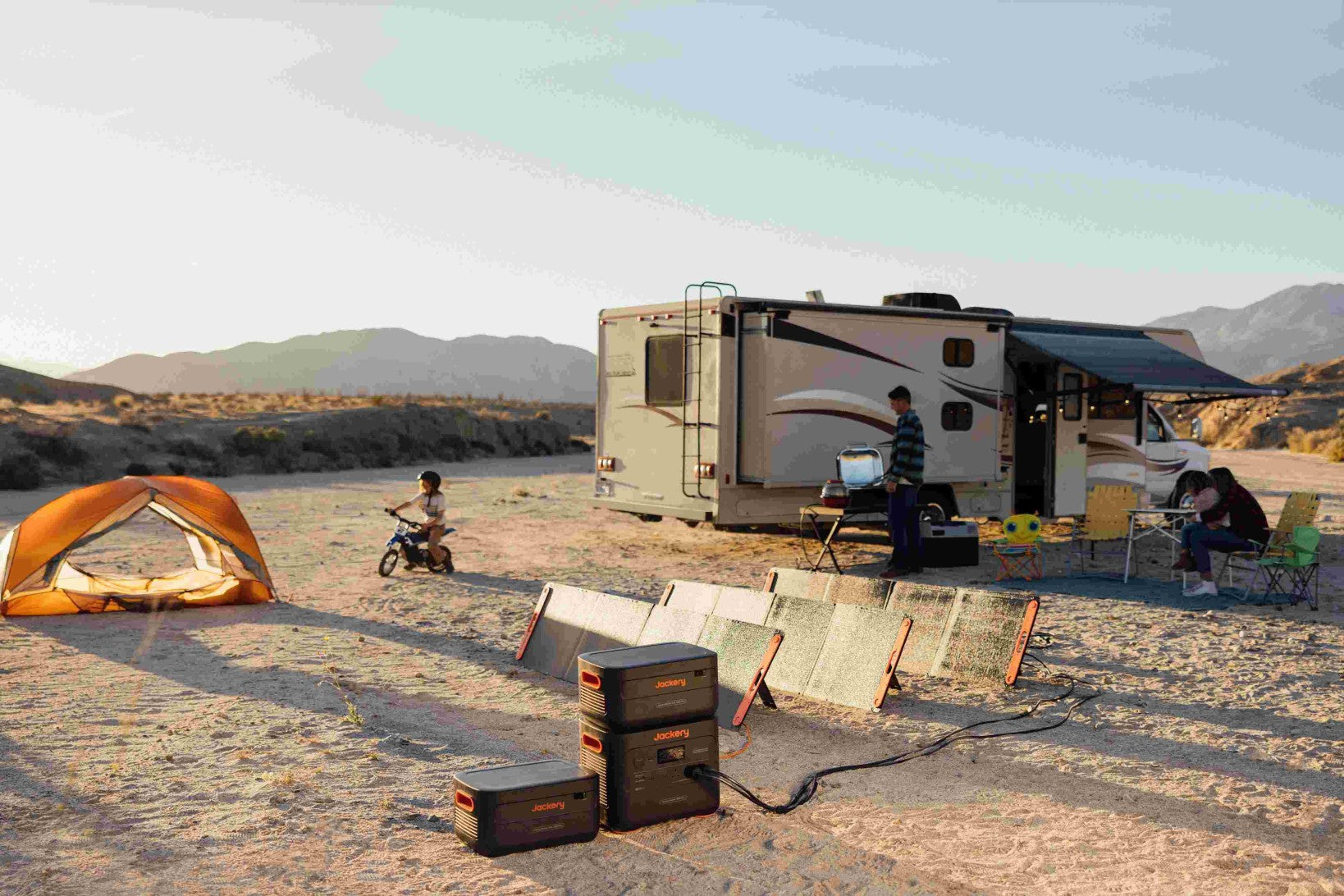Wales, with its rolling hills, majestic mountains and pristine coastline, showcases the untouched beauty of nature. One of the best ways to enjoy Wales' rocky mountains, expansive coast and tranquil valleys is to go wild camping. While it’s not legal to go wild camping in Wales without the landowner’s permission, many places welcome respectful wild campers who follow the rules.
In the following article, we’ll take an in-depth look at wild camping in Wales, exploring its legality, the rules you need to follow, popular destinations, essential gear and more. Although wild camping is about living in the wild without modern conveniences, a portable power source, like the Jackery Portable Power Station, can power your essential electronics and devices in case of an emergency.
|
Key Takeaways: |
|
● In Wales, wild camping is generally not allowed without the explicit permission of the landowner. Camping in Wales must follow rules such as minimising the impact on the environment, controlling noise, and avoiding prolonged stays. ● Popular camping sites in Wales include Snowdonia National Park, Brecon Beacons National Park, Pembrokeshire Coast National Park, Lleyn Peninsula and Plynlimon. ● Basic equipment for camping in Wales includes tents, sleeping bags, moisture-proof mats, backpacks and portable power stations. ● We highly recommend the Jackery Explorer 100 Plus for wild camping in Wales and other areas with higher portability; it's even suitable for travel by plane. ● To ensure that you leave no trace when camping, please take all garbage with you, refrain from damaging the surrounding environment, and avoid polluting water sources. ● Several main reasons why Wales has become a popular camping destination include magnificent natural scenery, rich outdoor activities and convenient transportation. |
Can You Wild Camp in Wales?
At its core, wild camping involves camping outside designated campsites and experiencing the thrill of wilderness survival, typically in remote or natural areas. For many outdoor enthusiasts, wild camping enables them to establish a deeper connection with nature, fostering a sense of freedom and adventure. In recent years, wild camping in Wales has become increasingly popular among outdoor sports enthusiasts.
Can You Wild Camp in Wales?
Many people wonder, can you wild camp in Wales? The answer to this question is usually no. In Wales, wild camping is generally not allowed without the explicit permission of the landowner. This means that you can't just camp somewhere and expect it to be legal. Even in remote areas such as Snowdonia or the Brecon Beacons, a permit is required to set up a tent, bivy tent, or tarp. Although this may seem overly strict, the government has implemented this regulation to protect the interests of landowners.
What Are the Penalties for Illegal Wild Camping in Wales?
In Wales, camping in the wild without the landowner's permission is considered trespassing and is a civil offence. The landowner can ask the illegal wild camper to leave, but this usually does not directly lead to criminal penalties unless the camper refuses to leave or causes damage. If you pack up and leave immediately after being warned by the landowner or the police, you will usually not be punished.
However, if you refuse to leave or cause damage, it may escalate to serious trespassing, which constitutes a criminal offense. This may result in a fine, imprisonment or both, with a maximum fine of up to £2,500 and a possible prison sentence of up to three months. Additionally, illegal wild camping may violate environmental regulations, resulting in noise, fires, and pollution from waste, and may lead to fines or prosecution.
What Rules Do I Need to Follow When Wild Camping in Wales?
Even if you have obtained permission from the landowner to camp in the wild, it is essential to follow responsible and careful camping practices. Here are the key rules you must follow when wild camping in Wales:

Rule 1: Keep Camping Small
Wales' natural environment is fragile, and to avoid excessive damage to vegetation and ecology, camping should be kept to a minimum. Avoiding large camping sites or groups can reduce visual and ecological disturbance to the natural environment. It is best to limit the number of people in a wild camp to no more than four.
Rule 2: Control Noise
Noise must be strictly controlled during the wild camp, especially at night (usually from 22:00 to 06:00 the next day), and loud noises or the use of audio equipment are prohibited. During the day, it is also advisable to avoid shouting or making excessive noise for prolonged periods to prevent disturbing wild animals and affecting the daily lives of nearby residents.
Rule 3: Avoid Long Stays
Generally, wild camping in the same place should not exceed three consecutive days, after which you need to move to another area. Staying in the same wild camp for an extended period may cause greater damage or disturbance to the surrounding environment, including soil compaction, accumulation of garbage, and other issues. Regular relocation is intended to disperse the impact of human activities on nature.
Rule 4: Keep a Low Profile
When camping in Wales, avoid wearing brightly colored clothing or carrying overly conspicuous equipment to reduce disturbance to wild animals (such as birds and deer). For example, use inconspicuous tents to blend harmoniously with the natural environment. Use soft light sources when travelling at night to avoid glaring at the surrounding environment.
Rule 5: Stay Away from Buildings and Historical Sites
Wales has many historical buildings (such as castles and stone monuments) and archaeological sites, which are protected by law. When camping in the wild, be sure to stay away from such areas and keep a distance of at least 30 metres. It is strictly forbidden to light fires, set up tents or carry out activities that may damage the ruins around the monuments.
Popular Places for Wild Camping in Wales
From majestic mountains and hills to stunning beaches and coastlines, you can experience a variety of wild camping locations in Wales. If you are planning your next wild camping trip in Wales, here are five popular wild camping locations we have listed:

Snowdonia National Park
Snowdonia National Park is a mountain national park located in northwest Wales. Its rugged beauty and diverse landscapes provide a playground for outdoor enthusiasts and adventurers, attracting about four million visitors each year. If you wild camp on the top of a mountain, you can overlook the magnificent panoramic views of the mountains and lakes. However, this freedom also comes with responsibility, as wild campers must obtain permission from the landowner before setting up tents in these remote areas.
Brecon Beacons National Park
The Brecon Beacons are renowned for their rugged mountains and tranquil lakes, such as those found in Lake Vyrnwy, which provide the perfect backdrop for camping. There are medieval castles and ancient villages scattered around, and you can visit the historical sites of Wales after camping.
Among them, Mynydd Llangynidr is a popular choice for wild camping, thanks to its picturesque scenery and secluded caves open to explorers. The visitor centre here also provides visitors seeking wild camping opportunities with a list of landowners who allow such activities.
Pembrokeshire Coast National Park
Pembrokeshire has one of the most beautiful coastlines in the UK and attracts hundreds of thousands of tourists every year, many of whom walk along the spectacular Pembrokeshire Coast Path. Pembrokeshire Coast National Park is home to numerous sea caves, rock formations, and natural arches, offering coastal camping experiences that bring geological wonders up close and personal.
In between wild camping, you can also experience rugged cliffs, rolling waves, and fields and hedgerows dotted with flowers. However, be careful when wild camping on the Welsh coast, as it is prohibited to set up tents near beaches or water sources.
Lleyn Peninsula
The Lleyn Peninsula has a winding coastline and many hidden beach and cliff campsites. For example, the parking fee at Ty Mawr Farm includes a wild camp permit, where you can camp wild. While camping here, you also have the opportunity to experience unique coastal horseback riding or participate in water activities such as sea fishing and kayaking. This is an essential stopover for migratory birds, and you may occasionally encounter rare birds when camping in the wild. However, pay attention to the tide time when camping by the sea and choose a campsite on higher ground.
Plynlimon (Pumlumon)
Plynlimon is one of the highest peaks in the Cumbrian Mountains in central Wales. It is known as the "Roof of Wales" and is the source of the River Severn and the River Wye.
The sense of wilderness here is powerful, making it a suitable destination for wild campers who seek solitude and adventure. In between wild camps, you can also experience hiking, bird watching, photography and stargazing. There is no designated camping site here (permission from the landowner is required), but the principle of "leaving no trace" must still be followed for wild camping.
Essential Equipment for Wild Camping in Wales
In the wild camp in Wales, facing the changing climate and diverse terrain, a well-equipped list can significantly improve comfort and safety. The following is a list of essential equipment recommendations based on the environmental characteristics of Wales:

Basic Equipment
The following is the basic equipment that needs to be packed for a wild camp in Wales:
Tent: a double-layer tent that is windproof and rainproof
Sleeping Bag: a warm sleeping bag made of down or highly warm synthetic fibre
Moisture-Proof Pad: an inflatable pad or a foam pad
Backpack: a 50-70 liter waterproof backpack
Portable Power Station: Jackery Explorer 100 Plus
Clothing
The following is the clothing that needs to be packed for a wild camp in Wales:
Waterproof Jacket: a hard shell jacket
Warm Mid-Layer: a fleece jacket or a down liner
Underwear: a perspiration-wicking underwear
Waterproof Pants: lightweight rain pants or jacket pants
Hiking Shoes: high-top waterproof boots
Hats and Gloves: a windproof hat and thin gloves
Cooking Equipment
The following is a list of cooking equipment that needs to be packed for a wild camp in Wales:
Portable Stove: gas stove or alcohol stove
Cooking Utensils: lightweight pots, cutlery, folding cups
Food: high-energy food (oat bars, dehydrated meals)
Waterware: water purification tablets/filters
Safety and Protective Equipment
The following are the safety and protective equipment you need to pack for wild camping in Wales:
Maps and Compasses: paper map backup
Multi-Purpose Knife: Swiss Army knife
Emergency Equipment: survival blanket, whistle
Sunscreen: sunscreen, sunglasses
Rain Gear: light raincoat or poncho
Other Practical Items
The following are other practical items you need to pack for wild camping in Wales:
Insect repellent
First aid kit
Headlamp/flashlight
Waterproof sealed bag
Hiking pole
Garbage bag
The above equipment suggestions are for reference only. Adjust the list according to the duration and season of camping before departure. For example, use mosquito repellent in the summer and increase warmth in winter.

Jackery Portable Power Station for Wild Camping
Wild camping in Wales offers an incredible opportunity to immerse yourself in stunning natural landscapes, from the rugged mountains of Snowdonia to the remote coastal paths. While wild camping generally requires permission from landowners in Wales, when done responsibly and discreetly, a Jackery Portable Power Station can significantly enhance your experience, making it safer, more comfortable, and more sustainable.
Wales's diverse terrain, including unpredictable weather and mountainous paths, makes reliable navigation crucial. Your smartphone, a dedicated GPS device, or a headlamp are lifelines. A Jackery ensures these devices remain charged. For instance, a Jackery Explorer 100 Plus (99.2Wh, 2.1 lbs) can recharge an iPhone 15 (approx. 3,279 mAh / 12.68Wh) roughly 7-8 times or keep your GPS device going for days, providing essential peace of mind in remote areas.
Traditional generators are noisy and produce harmful fumes, completely undermining the tranquillity and clean air of the Welsh wilderness. A Jackery operates silently (typically under 30dB) and produces zero emissions.
Jackery Explorer 100 Plus
At its core, the Jackery Explorer 100 Plus addresses the absolute top priority for any wild camper traversing the Welsh landscape: weight and bulk. This isn't a power station for your campsite
luxuries; it's a meticulously designed survival and convenience tool for the modern adventurer.

Weighing in at a mere 2.1 lbs (965 grams), it virtually disappears into your backpack. When you're pushing through challenging Welsh bog, scaling steep mountain paths in Snowdonia, or navigating the undulations of the Brecon Beacons, every ounce strapped to your back contributes to fatigue. The 100 Plus represents a negligible addition to your load, yet it unlocks a world of critical functionality.
Beyond its physical footprint, its 99.2Wh capacity is precisely engineered to be airline-friendly. For those travelling from the US or other international locations to start their Welsh adventure, this means you can carry it in your hand luggage with confidence. There is no need to check it in, so you don't have to worry about it being lost or damaged. You'll also have immediate access to power upon arrival, a small but significant detail for seamless travel.
The true genius of the Explorer 100 Plus lies in its charging capabilities, which are perfectly aligned with contemporary outdoor technology. This isn't just a generic power bank; it features a powerful 100W USB-C Power Delivery (PD) output.
This is paramount because modern smartphones, tablets, and exceptionally lightweight laptops (like a MacBook Air or similar ultrabooks) rely heavily on USB-C PD for rapid charging. You're not waiting hours for a trickle charge; you're getting serious power to your devices, reducing downtime and getting you back on the trail or to your scenic viewpoint faster.
For the wild camper, this translates directly into enhanced safety and self-sufficiency. Your phone is your lifeline for navigation, especially when using apps like OS Maps, especially in the Welsh hills, where visibility drops quickly. It's your emergency communication device for potential calls to mountain rescue in areas with intermittent cell phone service. It powers your headlamp for safe movement in the dark or preparing dinner. The 100 Plus ensures these critical tools remain operational.
|
Jackery Explorer 100 Plus Running Time |
|
|
GPS Device (30W) |
2.6H |
|
Phone (20W) |
6.2 Charges |
|
Walkie Talkie (5W) |
15.8H |
|
Camera (8.4W) |
9.9H |
|
Drone (90W) |
0.9H |
(*The working hours are only for reference; the actual working hours depend on your usage.)
How to Leave No Trace When Wild Camping in Wales?
As a responsible wild camper, you must protect the pristine beauty of Wales and ensure that every wild camping activity "leaves no trace". The following tips will help you follow environmental protection principles when wild camping in Wales and minimise the impact on nature.

Take All Garbage Away
Wales has a lot of rain, and garbage is easily washed into the water source. Therefore, all trash generated by wild camping must be packed and taken to designated recycling points, including biodegradable items such as banana peels and orange peels. Consequently, it is best to bring reusable tableware instead of disposable plastic products, which will ultimately result in a significant amount of waste.
Do Not Damage the Surrounding Environment
Prioritise the use of existing wild camping areas and avoid opening up new ones. If you choose your camping site, choose flat and hard ground (such as rocks or meadows) to reduce the crushing of vegetation. Wild camping in swamps, dunes, or alpine meadows can cause long-term damage and should be avoided. Additionally, it is essential to remember not to pick plants and to prevent damaging rocks or historical relics.
Do Not Pollute the Water Source
When setting up a wild camp, you need to stay at least 60 metres away from the edge of rivers and lakes. If you need to rinse items, fill a container with water and wash at least 30 metres away from a water source. Do not use detergent or soap to wash items in streams or rivers. Even if you are more than 30 metres away from a water source, use biodegradable and environmentally friendly products such as soap when using cleaning products.
Reduce the Impact of Campfires
Fire is prohibited in many areas of Wales, especially in the dry summer. If you need to cook, use a portable stove instead of a campfire. If you must have a fire, only use the designated fire ring, collect small branches that can be broken off the ground as fuel, and avoid cutting down vegetation. After burning the ashes, completely extinguish the fire with water and disperse the ashes after they have cooled to avoid leaving any human traces.
Properly Deal With Excrement
When wild camping, it is best to use a portable toilet or a deep burial method to dispose of excrement. The most traditional treatment method involves digging a 15-20 cm deep "cat hole" at least 50 metres away from a water source to bury the excrement. Non-degradable items, such as toilet paper and wet wipes, should be brought back for proper disposal and treatment. However, in coastal areas (such as parts of the Pembrokeshire Coast Path), it may be necessary to carry away waste.
Why Is Wales Such a Popular Destination for Wild Camping?
Wales is located in the west of the British Isles. With its unique natural landscape, rich outdoor activities and profound cultural heritage, Wales has gradually become a popular choice for wild camping enthusiasts. Here are some of the main reasons why Wales has become a popular wild camping destination:
Magnificent Natural Scenery
Wales boasts a diverse range of landscapes, including coastlines, mountains, forests, and lakes, such as Snowdonia and the Brecon Beacons, which cater to a wide variety of wild campers with varying preferences. The Pembrokeshire Coast National Park is renowned for its stunning cliffs, beaches, and bays, offering a unique seaside experience for wild camping.
Rich Outdoor Activities
In addition to wild camping, people can also experience a wealth of outdoor activities in Wales. For example, Mount Snowdon in Snowdonia is a popular place for hiking and climbing. The coast and lakes of Wales are ideal for a range of water activities, including surfing, kayaking, and fishing.
Convenient Transportation and Accessibility
Wales has convenient transportation. The capital, Cardiff, is connected to major cities by rail and road, and coastal towns also provide self-driving and public transportation networks. For example, London, Birmingham and other places can drive to Wales in 3-4 hours. Wales' comprehensive public transportation coverage makes it easy for tourists to arrive quickly, shortening the distance from "city to wilderness".
FAQs
The following are the frequently asked questions about wild camping in Wales.
1. Can you camp wild in Wales?
In Wales, wild camping is generally not allowed without the explicit permission of the landowner. This means that you cannot just go wild camping anywhere in Wales. If you have permission (in writing) from the landowner, then you can legally go wild camping, provided you follow the wild camping rules.
2. Where can you camp for free in Wales?
Although it is technically illegal to go wild camping in Wales without the landowner's permission, you can usually camp for free if you get permission from the landowner before setting up your tent.
3. Is it legal to camp on a beach in Wales?
Even if you want to go wild camping on a beach in Wales, you need the landowner's permission. Some beaches may have designated areas for wild camping or permit it at certain times of the year. However, always check the local regulations and get permission before going wild camping on any beach.
4. Can you sleep in a layby in Wales?
Although there is no specific law in Wales against sleeping in a car park, it is generally not allowed. For example, local authorities may issue traffic control orders that prohibit camping, cooking or sleeping in certain areas (including parking spaces). If you park your car to sleep, the police may ask you to leave.
Final Thoughts
Wales boasts mountains, wilderness, waterfalls, streams, and beautiful coastlines, making it an ideal destination for wild camping. In addition to obtaining permission from the landowner, wild camping in Wales must also adhere to the rules of camping, minimising impact, controlling noise, and avoiding prolonged stays. Of course, explorers going wild camping in Wales also need to bring equipment, including tents, sleeping bags, moisture-proof mats, backpacks and portable power stations. Finally, please make sure to "leave no trace" when wild camping in Wales.































































